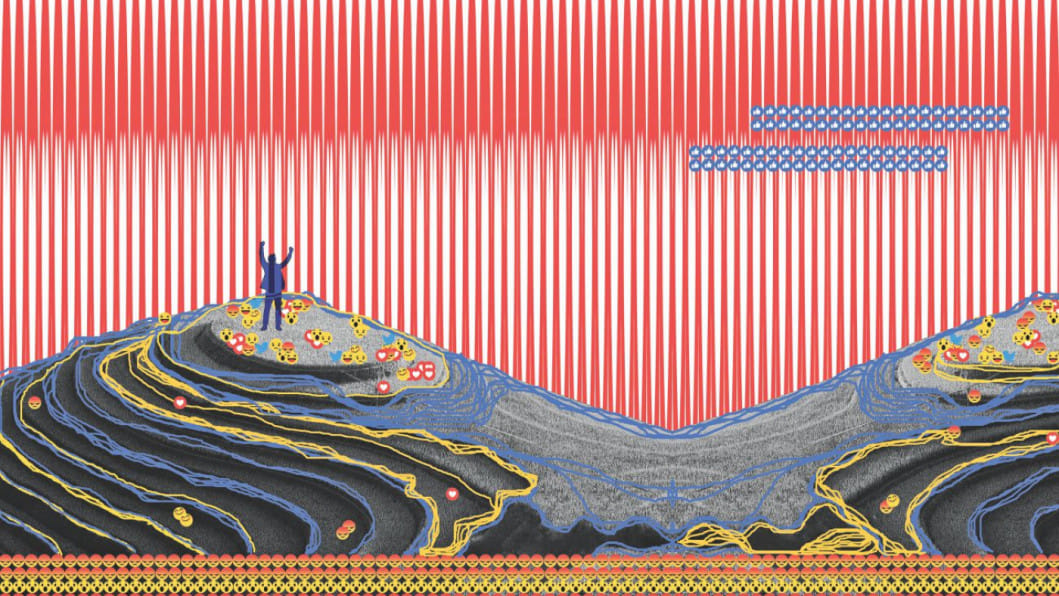The bot bubble

Allon Mahoto from Singapore, Dam Van Manh from Vietnam, De Light Jude from Nigeria and Ergun from Turkey—these are names of a few of the 1,000 Facebook profiles that followed my account within a span of two hours.
A bKash transaction worth BDT 800 in the evening transformed my makeshift Facebook account from zero followers to more than 1,000 by the time dinner was ready. How easy is it to buy fake Facebook followers in Bangladesh, you ask? Star Weekend's above-mentioned investigation perhaps best answers that question.
In fact, had the experiment continued for two more days—and with a little more cash involved—my newly-formed Facebook account could have hit 20,000 followers, and potentially surpass the Facebook accounts of some of the most-sought after celebrities of the country.
The person who "sold" me the followers claims that this business of his is merely a part-time affair. His main job is that of a digital marketer. For obvious reasons, he does not want to disclose how he managed to gather so many followers in such a short time. He, however, reveals that he does not depend on click-farming—the more traditional method, where organisations hire people to create fake Facebook accounts and generate likes and followers through them.
"Do you think it's possible for me or my team of three to sign in to 1,000 Facebook accounts and give you the followers in just two hours? Even signing in to each of these accounts would have killed a lot of time," he says. "You could say that I depend on a number of software and programming," he eventually reveals. As the conversation continues, he smirks and lets me know that my request for 1,000 followers was one of the smallest projects that he had undertaken.
"There are times when I end up charging BDT 50,000 for a project. From models and singers to even politicians, you may not believe me, but my team gets projects from some of the top celebrities of Dhaka," he says with a smile.
"Everybody wants followers. It helps them build their profile," he adds.
Celebrities buying fake Facebook followers, in order to further enhance their presence in the public arena, isn't unheard of. An article published in The New York Times recently alleged that celebrities such as Martha Lane Fox, a Twitter board member, and Michael Dell, the computer billionaire—aside from a number of others—bought thousands of fake followers from an American company named Devumi.
This shouldn't come as a surprise considering that there are more than 70 million automated accounts—accounts that simulate the behaviour of human beings—on Facebook. This is a statistic that was disclosed by the world's largest social media service itself.
"Group admins try to lure legitimate Facebook accounts to these groups by adding thousands of fake accounts. Once they are a part of the group, they share content and try to make them go viral."
Researchers even say that the number announced by Facebook was greatly toned-down and that the real number of fake accounts may range somewhere around 250 million. And it's not just Facebook. Researchers say that 20 percent of Twitter's active users are, in fact, bots.
This explains why users often end up getting fake followers or bots even when they don't want them. This is a trend that is quite common on Twitter. There are bots that automatically retweet or like whatever posts you share.
Researchers say that's because these bots are programmed to randomly like and share posts in order to counter Twitter's inspection algorithm, which deletes inactive or fake accounts.
This is also the reason why several businesspeople and publishers on Facebook have complained of receiving likes from inactive or dead accounts after legally boosting their Facebook pages. When you boost a Facebook page, you are given the opportunity to reach a wider audience. However, some bots, which are programmed to deceive Facebook's algorithm, end up liking your posts.
Bangladeshi celebrities or local corporates buying fake Facebook accounts is an issue that is yet to gain impetus and requires a lot more research. However, at least three individuals dealing with the selling of followers and "likes" have told Star Weekend that they did receive projects dealing with fake followers from various businesses and celebrities.
So how have these fake accounts made their way into our digital lives? To answer that question, one has to go back a few years. The increasing popularity of Facebook in Bangladesh after 2009 coincided with the rise of click farms. These are organisations, which would hire people to open as many Facebook accounts and generate as many likes as possible. Prior to the arrival of Facebook, the focus was mainly on clicking on advertisements available on Google's blogspot.com. There was money to be earned with each click. The clickers would eventually get a portion of the share of the earnings. The overuse of this strategy even led to many accounts getting banned for life by Google.
It was also possible to work individually. There were a number of websites available back in the day, which would pay you for every click. One could easily earn up to BDT 4,000–5,000 per month through these websites. There were several reports published, prior to 2015, which described Bangladesh as the source for the generation of some of the highest number of likes.
However, things gradually changed as Facebook repeatedly updated its policies.

In January 2015, Facebook implemented a strong effort to reduce the number of hoax links appearing on news feeds and accounts as well. In the same year, in October, the value for page likes started to diminish as Facebook introduced the "See First" option, which allowed users to see whatever they wanted to on their timeline. As a result the information from the pages they liked would eventually become secondary.
The combination of the above policies led to the decrease in the value of likes and hurt the click farms.
Aside from officially introducing policies, Facebook, starting from 2013, seemed to unofficially start cracking down on fake accounts.
"From my experience we have seen that Facebook does not officially announce these things (the process of cracking down fake profiles). But they create bots which identify fake profiles and delete them. Facebook's machine-learning algorithm is perhaps the most powerful in the world. After 2013, they managed to better identify patterns and go after fake accounts," explains Md Saimum Hossain, Co-founder and Head of Business, GEEKY Social Ltd.
"Researchers say that's because these bots are programmed to randomly like and share posts in order to counter Twitter's inspection algorithm, which deletes inactive or fake accounts."
Facebook's latest policy, announced this year, has made the situation a lot worse for news organisations and brands. Mark Zuckerberg stated that Facebook was going to focus more on "meaningful social interactions". This meant that Facebook would diminish posts from brands, publishers, marketers and news stories on the timelines, and would instead focus on posts made by the user's friends.
What this has done is that it has hugely decreased the reach of Facebook pages. This means that even if you have liked Prothom Alo's page on Facebook, there's a high chance that you won't get to see the page's posts on your timeline, unless and until Prothom Alo boosts its articles with extra money. As a result of these policies, the demand for the artificial generation of likes has decreased.
Today, people are more focused on buying followers, and have decided to shift from pages to increasing the number of members of Facebook groups. Mahbub Rahman, a cyber security analyst explains why.
"Because the value of likes started decreasing, a number of page owners began to change the names of their respective Facebook pages and sell them off to different e-commerce companies, which later used these pages for their own business. For instance, if a page had 100,000–200,000 likes, they would be able to sell it for around BDT 8,000–10,000. It was a win-win situation for both sides as these new companies need to show-off a high number of likes," says Mahbub.
"As far as followers are concerned, the more the number of followers, the more authentic a Facebook user is considered. On the other hand, you can also buy and add 1,000 accounts to a particular Facebook group for just BDT 80. Facebook does not have any particular policies on groups as compared to the pages. As a result, there's more engagement in the groups and the content reaches more people," he adds.
The logic is simple. The more the number of people that join the group, the more attractive it will be. Group admins try to lure legitimate Facebook accounts to these groups by adding thousands of fake accounts. Once they are a part of the group, they share content and try to make them go viral. The possibility of that happening in a group is a lot more since there's no problem with reach.
In addition to populating groups, there is evidence that some digital marketers are actually creating fake Facebook accounts and adding as many friends as possible in order to increase its reach and be more prevalent on the timelines.
Perhaps the most dangerous aspect of this whole saga is that of privacy. While these accounts may be fake, the fact remains that all of them have photos and videos, which were, essentially, stolen. According to Mahbub, a majority of the fake accounts used to produce fake followers are either hacked or have content which is being used without permission.
"No matter how much we have progressed, you have to understand that there's still a huge section of people in our country, especially in the villages, who aren't digitally prepared. These are people who click on random links, which they receive via chats and then try to log in with their Facebook IDs and passwords, eventually getting hacked," explains Mahbub.
Debjani Shyama, a Dhaka-based journalist, is one such victim. She found out through her friends that there was a fake profile of hers floating around on Facebook. She couldn't view it because the person who made the account had blocked her.
"It's not just me. A number of my friends have been victims as well. You usually find that these fake accounts write cheesy posts and like random things," says Debjani.
Abonti Ahmed is the account name of one such fake follower I happened to buy. She looks like someone in her mid-30s and according to her profile, lives in Rome, Italy. However, a closer inspection of her photos clearly indicates that she lives in Bangladesh.
For all you know, the woman in the picture, in actual life, may not be named Abonti at all. She is probably a victim of identity theft, or even worse, her account might have been hacked.
Abonti's story is just one out of the thousands. But of course, these are stories that apparently don't matter. As long as one has millions of followers to feed the ego, one can remain satisfied.
Follow Naimul Karim @naimonthefield





Comments